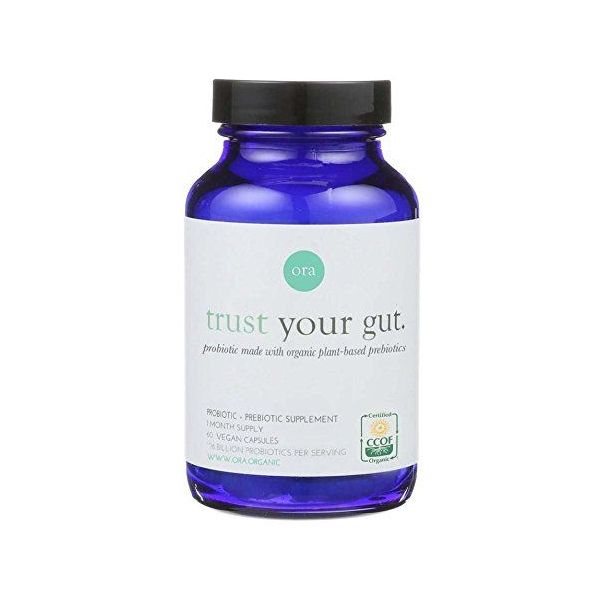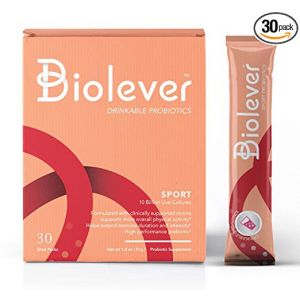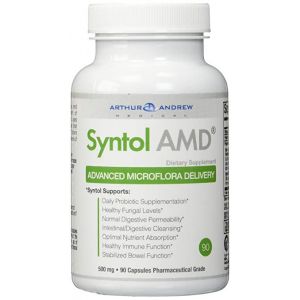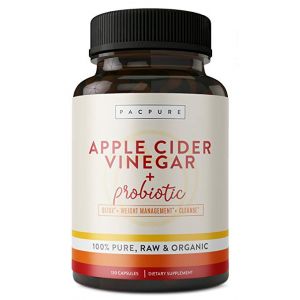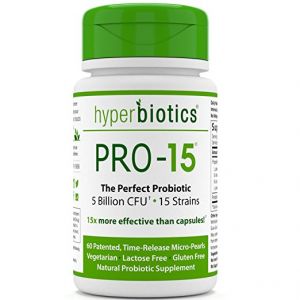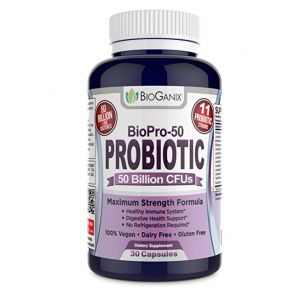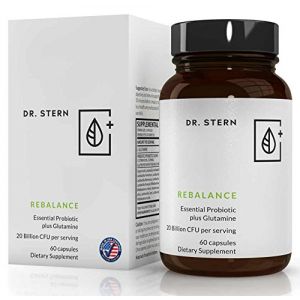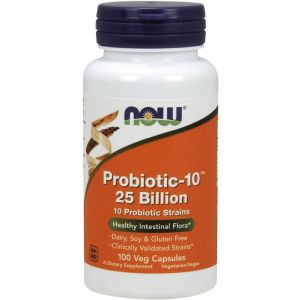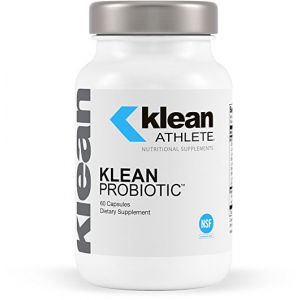Pros:
- Probiotic supplement with prebiotics for optimal digestive health
- Provides six probiotic strains and 16 billion CFUs per serving
- Made in the USA
- Certified-vegan
- Non-GMO project verified
- Clinically documented strains
- Freeze-dried and travel ready
- Acid-resistant strains
- Refrigeration not required
- Free of dairy, gluten, soy, grain, GMOs, tree nuts, added sugars, fillers, artificial colors, flavors, sweeteners, or preservatives
- Customer reviews remark that it helped with bloating
Every batch of Product is tested for:
- Ingredient Potency
- Heavy Metal Content
- Microbial Contaminants
- Pathogens
Annually products are screened for:
- Supplement Fact Verification
- Pesticides (this is very important and many companies DO NOT do this!)
- Allergens (including gluten, dairy, peanut, and soy)
Ingredients Concern: None discovered
Cons:
Probiotics in general may cause stomach discomfort in some people however this one has been noted to be softer on the stomach
Ora Organic was born out of a love for plant-based nutrition, ethical sourcing, and helping others be well. Ora comes from the New Zealand Māori-language greeting Kia Ora, which literally translates to be well. And that's what the founders Will, Erica, Sebastian & Ronald set out to do to help you be well.
They create products that they take themselves, and that means they only use plant-based ingredients, source organic wherever possible, and have the highest testing standards for all of our products.
Research indicates that the minimum daily serving of probiotics which supports optimal digestive and immune system function is 10 billion CFUs [1, 2].
Probiotics are commonly added to supplements for digestive and immune support, and they are often recommended when people are experiencing diarrhea due to antibiotics [3-5]. Similarly, probiotics are frequently suggested for people who frequently experience intestinal problems due to issues that are related to the improper digestion of food or nutrients [6].
Research has demonstrated that prebiotics enhance the growth and activity of probiotics. Accordingly, prebiotics (e.g., inulin) are being added to more probiotic supplements [7]. Probiotics improve the body's response to allergens, especially cat and dog hair, pollen, and dust mites, by thickening the viscosity of the airway's mucosal lining and disrupting the production of pro-inflammatory proteins [9]. This type of enhanced immunity and reduced sensitivity to allergens is dramatically improved and sustained when supplementation starts at an early age [3, 10].
Probiotics help improve the body's ability to degrade cholesterol as well as nutrient absorption, both of which enhance weight control [13, 14].
Probiotic supplementation also improves the body's response to stress and supports optimal hormone levels [15].
Digestive health [1-4]; Immune system health [1-4]
Probiotics enhance the health of the digestive tract by improving the levels of good bacteria in the gut [1]. In addition, to disrupting the growth of harmful bacteria, fungi, viruses, probiotics release enzymes and other substances that have antimicrobial activity [3]. Several of the enzymes also aid the digestion of food and this reduces the occurrence of food-related stomach problems (e.g., constipation, gas, bloating, diarrhea) [12]. Furthermore, probiotics heighten the breakdown of nutrients, which means that a higher concentration of essential nutrients reaches the bloodstream and different areas of the body [1].
Probiotics also strengthen the immune system by disrupting pro-inflammatory protein activity, stimulating the release of immunoglobulins, and heightening the body's natural antioxidant potential [13]. They also promote the proper balance of anti-inflammatory and pro-inflammatory proteins [14].
Probiotics support proper digestion and an active lifestyle by increasing the number of good bacteria in the gut [3]. This targets digestive issues that may cause bloating, gas, diarrhea, constipation, etc.; all of which may lead to decreased physical activity [3]. Similarly, probiotics release enzymes that disrupt the growth and activity of harmful microorganisms which can also cause illnesses or infections that subsequently reduce activity levels [3, 13-15].
In addition, probiotics enhance the body's ability to absorb nutrients, including vitamin C, calcium, and iron, which are known to boost energy levels [1, 16].
Prebiotics (e.g., inulin fiber) provide nutrients that enhance the growth and activity of the probiotics [1].
Key Ingredients: Ora Probiotic Blend (80 mg - 16 Billion CFU): Lactobacillus acidophilus, Lactobacillus reuteri, Bifidobacterium bifidum, Bifidobacterium breve, Bifidobacterium lactis, Bifidobacterium longum, Organic Jerusalem Artichoke Inulin (1.28 g)
All Ingredients: Ora Probiotic Blend (80 mg - 16 Billion CFU): Lactobacillus acidophilus, Lactobacillus reuteri, Bifidobacterium bifidum, Bifidobacterium breve, Bifidobacterium lactis, Bifidobacterium longum, Organic Jerusalem Artichoke Inulin (1.28 g), Vegan Capsule (pullulan)
Take both capsules at the same time of day. Probiotics are most effective when taken just before or with a meal. Best time to take probiotics: In the morning with breakfast, or at least within 30 minutes of eating a proper meal.
The product is shelf stable even after being opened. Store in a cool, dry place away from moisture, sunlight and changes in temperature.
These statements have not been evaluated by the FDA. These products are not intended to diagnose, treat, cure or prevent any disease.
1. Sheridan PO, Bindels LB, et al. Can prebiotics and probiotics improve therapeutic outcomes for undernourished individuals? Gut Microbes. 2014; 5(1):74-82.
2. Padayatty SJ, Levine M. New insights into the physiology and pharmacology of vitamin C. CMAJ 2001;164:353-5.
3. Kechagia M, Basoulis D, et al. Health benefits of probiotics: a review. ISRN Nutr. 2013;2013:481651.
4. Schiffrin EJ, Thomas DR, Kumar VB, et al. Systemic inflammatory markers in older persons: the effect of oral nutritional supplementation with prebiotics. J Nutr Health Aging. 2007, 11(6):475-479.
5. Szajewska H, Konarska Z, Kolodziej M. Probiotic bacterial and fungal strains: claims with evidence. Dig Dis. 2016;34:251-259.
6. Hempel S, Newberry SJ, Maher AR, et al. Probiotics for the disruption and treatment of antibiotic-associated diarrhea: a systematic review and meta-analysis. JAMA. 2012;307(18):1959-1969.
7. Ouwehand AC, DongLian C, Weijian X, et al. Probiotics reduce symptoms of antibiotic use in a hospital setting: a randomized dose response study. Vaccine. 2014;32(4):458-463.
8. Deshpande GC, Rao SC, Keil AD, Patole SK. Evidence-based guidelines for use of probiotics in preterm neonates. BMC Med. 2011;9:92.
9. Kliglerr B, Cohrssen A. Probiotics. Am Fam Physician. 2008, 78(9):1073-1078.
10. Kalliomäki M, Salminen S, Arvilommi H, Kero P, Koskinen P, Isolauri E. Probiotics in primary disruption of atopic disease: a randomised placebo-controlled trial. Lancet. 2001;357(9262):1076-1079.
11. Kukkonen K, Savilahti E, Haahtela T, et al. Probiotics and prebiotic galacto-oligosaccharides in the disruption of allergic diseases: a randomized, double-blind, placebo-controlled trial. J Allergy Clin Immunol. 2007;119(1):192-198.
12. Doron S, Snydman DR, Gorbach SL. Lactobacillus GG: bacteriology and clinical applications. Gastroenterol Clin North Am. 2005;34(3):483-498.
13. Manzoni P, Mostert M, Leonessa ML, et al. Oral supplementation with Lactobacillus casei subspecies rhamnosus disrupts enteric colonization by Candida species in preterm neonates: a randomized study. Clin Infect Dis. 2006;42(12):1735-1742.
14. Wang Y, Li X, et al. Probiotics for disruption and treatment of respiratory tract infections in children: A systematic review and meta-analysis of randomized controlled trials. Medicine (Baltimore). 2016;95(31):e4509.
15. Guillemard E, Tanguy J, Flavigny A, et al. Effects of consumption of a fermented dairy product containing the probiotic Lactobacillus casei DN-114 001 on common respiratory and gastrointestinal infections in shift workers in a randomized controlled trial. J Am Coll Nutr 2010; 29:455-468.
16. Gomes AC, de Sousa RG, Botelho PB, Gomes TL, Prada PO, Mota JF. The additional effects of a probiotic mix on abdominal adiposity and antioxidant Status: A double-blind, randomized trial. Obesity (Silver Spring, Md). 2017, 25(1):30-38.

